On Friday, the European Union learned that with austerity riots, struggling currency, rising anti-Semitism, and growing neo-Nazi groups it’s apparently still possible to be a harbinger of peace.
The Nobel Peace Prize for the euro bloc was awarded for six decades of “the advancement of peace and reconciliation, democracy and human rights in Europe.”
Surely the well-deserved 2010 award to Liu Xiaobo might have reminded the Nobel Committee that there are men and women risking their lives every day around the globe as prime contenders for “the person who shall have done the most or the best work for fraternity between nations, the abolition or reduction of standing armies and for the holding and promotion of peace congresses” — as deemed by the creator of dynamite and arms manufacturer Alfred Nobel.
But the head-scratching EU prize also serves as a reminder to check in on the 2009 recipient, especially as a foreign policy debate — the third of the presidential debates — looms Monday. Moderator Bob Schieffer will ask about America’s role in the world, Afghanistan and Pakistan, red lines with Israel and Iran, the changing Middle East and the new face of terrorism, and the rise of China.
A matter of months into his presidency, Obama was awarded the Nobel Peace Prize “for his extraordinary efforts to strengthen international diplomacy and cooperation between peoples.”
“Obama has as President created a new climate in international politics. Multilateral diplomacy has regained a central position, with emphasis on the role that the United Nations and other international institutions can play. Dialogue and negotiations are preferred as instruments for resolving even the most difficult international conflicts. The vision of a world free from nuclear arms has powerfully stimulated disarmament and arms control negotiations. Thanks to Obama’s initiative, the USA is now playing a more constructive role in meeting the great climatic challenges the world is confronting. Democracy and human rights are to be strengthened.
“Only very rarely has a person to the same extent as Obama captured the world’s attention and given its people hope for a better future. His diplomacy is founded in the concept that those who are to lead the world must do so on the basis of values and attitudes that are shared by the majority of the world’s population.
“For 108 years, the Norwegian Nobel Committee has sought to stimulate precisely that international policy and those attitudes for which Obama is now the world’s leading spokesman. The Committee endorses Obama’s appeal that “Now is the time for all of us to take our share of responsibility for a global response to global challenges.”
It’s an award for which Gandhi, Pope John Paul II, and Vaclav Havel — great men who left indelible impressions on humanity — were all passed over.
It’s also an award that has been bestowed upon Yasser Arafat and Le Duc Tho.
So three years later, with a presidential term under his belt and an award based on hope of what he might do or inspire, has Obama earned his Nobel?
Terrorism: Last year, a U.S. team killed Osama bin Laden in Pakistan. Getting rid of the most wanted terrorist is good and such a targeted assassination, it can be argued, was necessary to work toward peace. But al-Qaeda is still alive, having been taken over by bin Laden deputy Ayman al-Zawahiri. It’s branched out with al-Qaeda in the Arabian Peninsula, Al-Shabaab, al-Qaeda in the Islamic Maghreb, and more. It’s exploiting revolutions in the Arab world in an effort to gain a foothold in shaky new democracies and citizen rebellions. It’s inspired countless more militants who know that the slaying of an idolized leader is not the end to a war on terror, but another rallying cry to strike against the U.S. and American interests. And another 9/11 attack last month took the lives of four Americans in Benghazi, including the first U.S. ambassador to die in the line of duty since 1988.
Middle East peace: This was one of the goals of Obama upon coming into office — advance the peace process. In a July TV interview, Obama named the failure to do so as one of his personal failures as president. “It’s something we focused on very early. But the truth of the matter is that the parties, they’ve got to want it as well,” Obama said. Problem is, in the process of this push, the White House has pushed stalwart ally Israel further away than ever. Double fail.
Iran: Nuclear weapons aren’t very peaceful. Believing that the Islamic Republic just wants its centrifuges and secret plants and weapons-grade uranium for medical research and energy is naive. Yet the White House has firmly held to its conviction that diplomacy along with sanctions will derail Iran’s nuclear program that has steadily advanced over Obama’s term (see Bibi’s red line speech). Considering how Tehran dances around P5+1 talks, it’s a stretch to say that diplomacy is being conducted. And even though sanctions bite, they’re not proving a deterrent to a messianic nuclear quest. If peace is achieved through strength, where will lukewarm resolve lead?
Arab Spring: The administration was clearly taken aback by how to respond to these grass-roots expressions of people power. Obama has bragged of American support for these democratic movements, and taken a bit too much credit for air support led by the French and British that aided Libyan rebels in overthrowing dictator Moammar Gadhafi. But the White House has been selective in its support. Iranians cried for U.S. help in their 2009 Green Revolution, a memo to Washington that went unanswered. Peaceful (and extremely brave) protests against Syrian tyrant Bashar al-Assad were treated with kid gloves by a wary White House, and now the security situation has deteriorated to a point where, if there’s no help from the rest of the world, rebels are greater targets to well-heeled extremists who want to weasel in. More than 30,000 Syrians have died from the brutal government crackdown. And a Jasmine Revolution in China? Forget any support of that.
UN Human Rights Council: The Obama administration reversed Bush-era policy on shunning the discredited HRC, which boasts human-rights-abusing nations as members. The pledge was that the U.S. would reform the body from within. Current members of the council include dictatorship Burkina Faso, China, Cuba, Russia, and Saudi Arabia. No reform here.
Russia: The famed “reset” has only led to an emboldened Kremlin that goes after its political opponents with impunity — and in a Washington/Moscow relationship where Czar Vladimir is assured by Obama, “After my election, I have more flexibility.” Obama exercised said flexibility early in his term, though, when he killed the Eastern European missile defense shield hotly opposed by Russia (and Iran). Cozy relations are doggedly pursued despite Russia continually propping up tyrants at the UN Security Council.
Global Zero: The Nobel Committee “attached special importance to Obama’s vision of and work for a world without nuclear weapons.” This has manifested in a Nuclear Security Summit and promises to Congress to modernize the nuclear arsenal. Does pushing through a New START treaty with an emboldened Kremlin qualify as peace-generating arms reduction?
Drone strikes and targeted assassinations: Alfred Nobel might appreciate the new weapons technology, but a “kill list” might freak out the Nobel Committee.









Join the conversation as a VIP Member